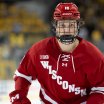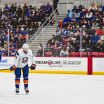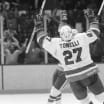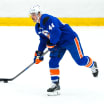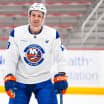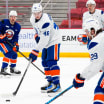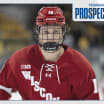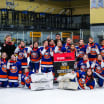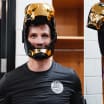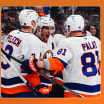No longer NHL patsies, the New York Islanders had earned respect throughout the league heading into the 1976 playoffs. It wasn't merely because they had reached a Game Seven of the third playoff round in 1975, nor that they rebounded from a three games to none deficit to take four straight from the Penguins.
The Isles maintained their growth momentum in the 1975-76 campaign boosting their total points from 88 the previous year to 101 as they prepared for the playoffs and compelling challenges.
Their first-round foe, the Vancouver Canucks, had owned the Isles during the regular season. Over five games, the Islanders had failed to win a single match, losing three and tying two.
Maven's Memories: The 1976 Playoff Run
Ed Westfall plays through a broken foot, as Isles get to the third round of the playoffs
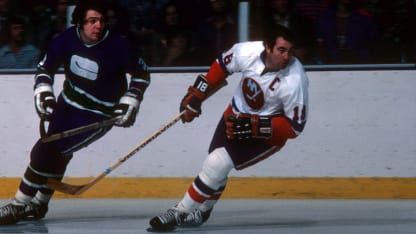
© B Bennett/Getty Images
By
Stan Fischler
Special to NHL.com
To some, who remembered the first-rounder with the Rangers a year earlier, this set with the Canucks would be an even tougher best-of-three affair.
"I call it the 'Suicide-Russian-Roulette Round," cautioned coach Al Arbour, who knew full well that anything can happen in a three-game series with a team which had mastered his during the regular season. And the players players agreed.
"I'm terrified of Vancouver," warned Jean Potvin who -- with his All-Star brother Denis -- would have to bring his A game to the rinks.
But as Great Britain's legendary World War II leader, Winston Churchill, once said: "Fear is a reaction and courage is a decision."
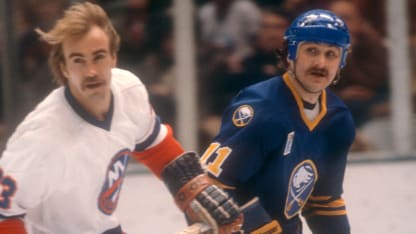
© Bruce Bennett/Getty Images
Sure enough, the two decisions -- first in Uniondale and then Vancouver -- went to the Islanders with surprising ease, 5-3 and 3-1, respectfully, with Glenn Resch maintaining his mastery between the pipes.
The next -- quarter-final -- round would be a best-of-seven tourney against the Buffalo Sabres who finished four points ahead of the Isles in the regular standings. That guaranteed the Western New Yorkers the first two games at home.
And for the second year in a row, the Isles launched the quarter-final series behind the eight-ball. They lost the opener 5-3 and were torpedoed two nights later by Danny Gare's overtime goal for a 3-2 Buffalo victory.
More perplexing for Arbour was devising a strategy to blunt Buffalo's French Connection unit. Led by Gil Perreault -- alongside Rene Robert and Richard Martin -- the line previously had dazzled the Isles with their slick maneuvers.
Now it was up to coach Arbour to produce an antidote for the ailment. Al's first move was to invade his basement, haul out reels of videotape while zeroing in on Perreault's maneuvers in particular.
What Radar learned was that Perreault had a habit of applying the brakes after entering the Isles' zone so he could arrange a pass just inside the blue line. With that bit of intelligence, the coach instructed his defense to clog Perreault's ice acreage; which they did.
"Leave it to us to do it the hard way," promised the Islanders off-season sheep farmer Billy MacMillan, "but we'll do it; just wait and see."
The 14,865 faithful who jammed Nassau Veterans Memorial Coliseum had to wait until the third period for MacMillan to break a 3-3 tie in the most curious manner.
Riding the bench as a utility forward, Mac was dispatched to the ice because Bob Nystrom had left his unit for skate repairs. Arbour moved Billy on to a line with Bryan Trottier and Gary Howatt. In no time at all, Howatt slid a pass to Trots who tested goalie - and former Islander - Gerry Desjardins.
Desjardins made the save but failed to clear the rebound sitting at the edge of the crease. Making like a lancer from ancient times, MacMillan lunged at the puck, pushing it over the goal line: 4-3, Islanders.
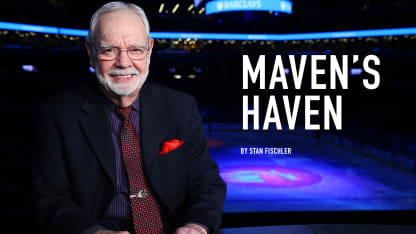
RELATED: MAVEN'S HAVEN
Less than a minute later Billy Harris made like an Olympic track star before beating Desjardins on his doorstep cementing the 5-3 victory.
No less gratifying was the fact that the triumph was accomplished without Ed Westfall. The Captain had been sidelined with a fractured small bone in his right foot after blocking a shot from Buffalo defenseman Jocelyn Goevremont.
As a result, Arbour laid out a lineup for Game Four, conspicuously without Number 18. The coach didn't know it at the time but he was setting the stage for one of the most memorable -- not to mention courageous -- moments in Metropolitan New York sports history.
At age 35, Westfall had long ago established himself as the club's leader. He had nothing further to prove when he reported to the Coliseum medical staff where he was treated with anti-inflammatory drugs, designed to reduce the foot swelling.
Arbour, his players and the fans did not expect 18 to put on his jersey; that is except for Westfall, himself. He told Radar in plain English: "I want to play."
Admiring his captain's courage -- and the motivational effect it would have on his players -- Arbour consented, provided that a method could be found so that Ed's injury would not be further aggravated.
First, Westfall had his foot "frozen." That done, the training staff found a plastic skate boot that would both protect the wound but also allow Ed's foot to fit into his skate.
A half-hour later a collective gasp was evident throughout the arena when the Captain skated out for the National Anthem.
"He gave the whole team a lift," Arbour asserted. "I knew then and there that he'd give us a great effort."
Multi-tasking is what the Captain's performance was all about. In some segments of play Eddie was tenaciously killing penalties; in others he would be moved to center and then to right wing as deemed necessary by the coach.
Throughout the game, Eddie energized the younger Islanders, particularly a future captain -- Denis Potvin. The starry backliner scored once in the first frame and again in the middle period as his mates tied the series with 4-2 decision.
In the dressing room, post-game, Westfall's heroic playing-with-pain effort was evident as he slowly unlaced his skates. The "freeze" had begun to thaw and his injured foot had ballooned in size.
"It hurts like hell now," moaned Westfall while soothing the ache by reflecting on the score. When reporters pressed him about another "comeback," swollen foot or not, Eighteen said he would not be denied the opportunity to play in the pivotal Game Five in Buffalo.
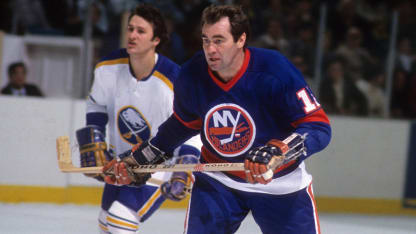
© B Bennett/Getty Images
This time the Isles trailed 3-2 with less than five minutes remaining in the third period. It was a time for heroics and the man who had become the league's leading playoff performer did it again.
Denis Potvin accepted a pass from J.P. Parise as the clock reached the 15:30 mark in the third period and beat Desjardins to tie the count at 3-3. With overtime looming, the Islanders were in no mood for patience.
Now it was defenseman Bert Marshall's time to step into the winner's circle. The snowshoeing veteran had not scored a single goal during the entire 1975-76 season. So, why should Bert do it now, as he camped at the blue line when Andre St.Laurent had the puck?
"Unless the puck comes to him at the offensive blue line; unless he gets lots of time, Bert will usually just throw the puck back into the corner," said Jean Potvin. "So, we kept telling Bert to shoot at the net; you never know; you might get a break. We were always kidding him."
This time the defense-minded backliner had to make a split-second decision.
Marshall: "Players were coming across from the other corner -- jamming in front of the net so. I decided that I wanted to try a shot on goal and thought I might have a long-shot chance to make it. If I could just get the shot on net it had a chance of going in."
Jean Potvin: "We were all in awe. I saw it go in the net and just sat there on the bench looking!" Marshall had won the game, 4-3, putting the Isles ahead three games to two in the tournament.
Wrapping up the series in Game Six with a 3-2 win at home, the Isles looked to Captain Westfall again. Number 18 responded with a goal while Clark Gillies capped the contest and the quarter-final round by punching home the rebound of Trottier's shot.
For the second straight season, the Islanders marched into the semi-final round; this time against the dynastic Montreal Canadiens.
Not surprisingly, the Uniondale skaters were heavy underdogs. No less astonishing was Al Arbour's attitude toward his team.
"Our club has a lot of character," Radar concluded. "We just keep plugging away; grinding it out."
Meanwhile, Montreal Star columnist Red Fisher summed the Canadiens' prevailing thought on the upcoming semi-final series with this headline: THE ISLANDERS HAVE COME A LONG WAY.
In other words, Habs beware!
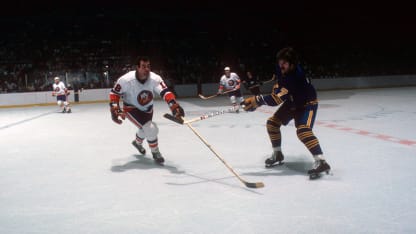
© B Bennett/Getty Images
NINE UNSUNG HEROES OF THE 1976 PLAYOFF VICTORIES
1. BERT MARSHALL: "The team doesn't pay me to score goals," he said. And that was true but the unobtrusive defenseman made headlines with his winner in Game Five.
2. ANDRE ST. LAURENT:Known to some as "The Honest Blocker," the French-Canadian digger figured in some big goals while doing his usual checking job.
3. GARRY HOWATT: Notorious for his fisticuffs as well as persistent play, Howie became part of a checking line that pushed the gritty Isles to the third playoff round.
4. BOB NYSTROM:In a season where rookie ace Bryan Trottier dominated the headlines, Battlin' Bob potted 23 goals and 25 assists but inevitably was overshadowed by Trots..
5. LORNE HENNING: Ed Westfall's partner in penalty-killing had matured into one of the best shorthanded players in franchise history.
6. JUDE DROUIN:The man who made the second line tick, Jude finished the season with 21 goals and 41 assists alongside the more-heralded J.P. Parise. In Hollywood, Jude would have won an Oscar as "Best Supporting Actor."
7. DAVE LEWIS: While Denis Potvin was a leader on defense and offense, the trio of surrounding Dmen were valuable front men for goalies Bill Smith and Glenn Resch. Lewie ranked among the most dependable.
8. GERRY HART:The native of Flin Flon, Manitoba was the grittiest of the blue liners and always ready to drop the gloves.
9. JEAN POTVIN: Potsy played as much a part in his kid brother's development as anyone and received little credit for doing so.


